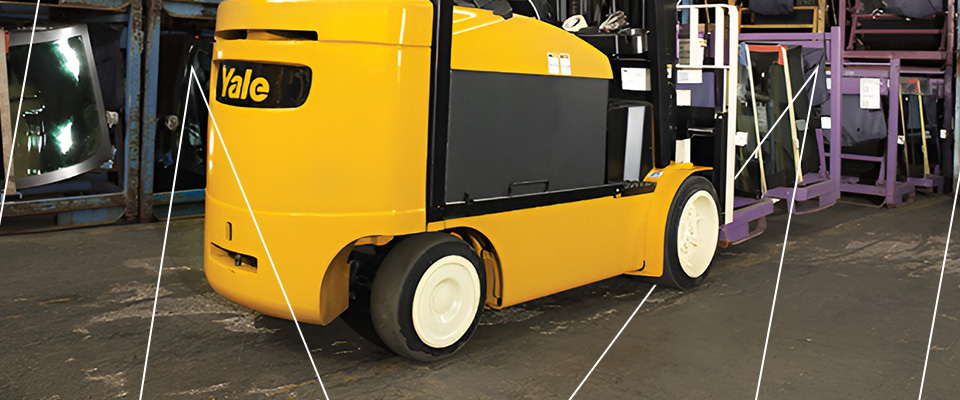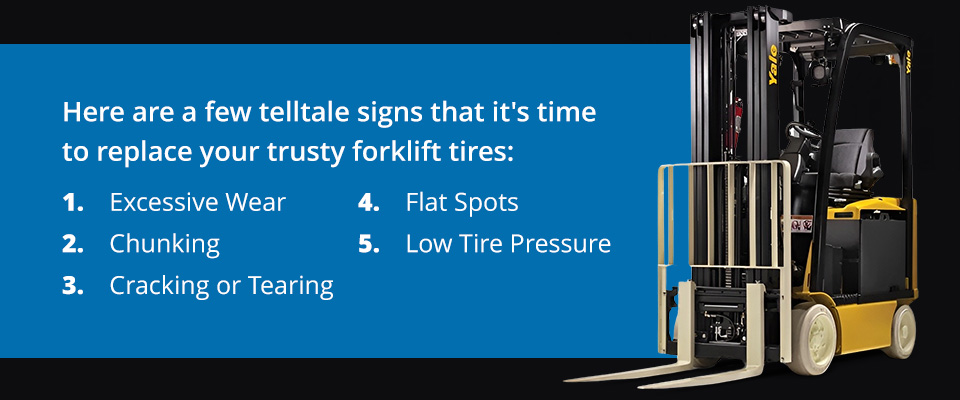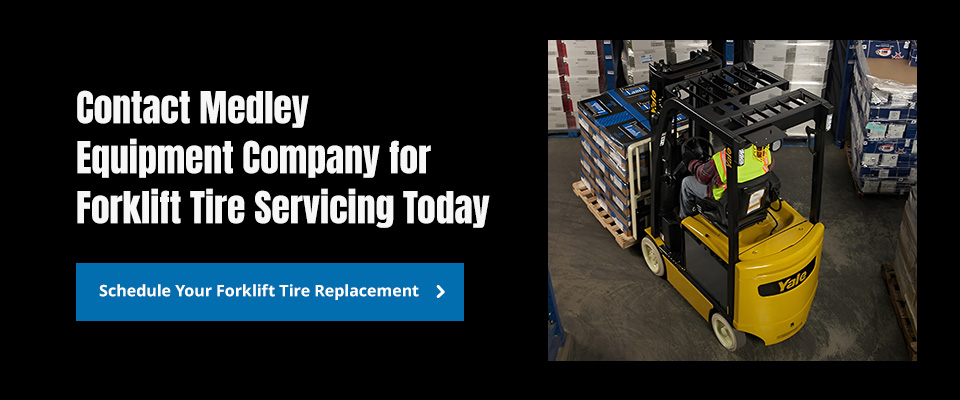
Forklift tires play a critical role in warehouses, distribution centers and other facilities that bank on heavy equipment. You might be surprised how much a decent set of forklift tires can improve vehicle life span, safety, traction, fuel efficiency and performance.
If your company relies on forklifts for everyday operations, it’s important to keep up with tire changes. Let’s look at some common sources of wear, signs indicating the need for new forklift tires and the benefits of a tire replacement.
Why Is It Important to Replace Forklift Tires?
Forklifts are a staple for carrying and transporting large loads. However, they have narrow wheelbases that make them susceptible to tip-overs.
As tires wear out over time, they further reduce stability, rendering the vehicle even more likely to tip. They also shake and push vibrations up through the seat to the driver, causing extreme discomfort, fatigue and even stress injuries.
Additionally, battered and damaged tires have weak traction, increasing the risk of swerving on slippery surfaces. On top of that, deteriorated tires force the equipment to work harder and consume more fuel.
With that in mind, replacing forklift tires when needed is crucial to mitigate safety and performance issues, instability, fuel wastage and operator fatigue.
What Can Damage Forklift Tires?
Before we get into the signs to replace your forklift tires, it’s important to understand why they wear out over time. That way, you can adjust your operations to keep these issues at bay.
Forklift tires fray and degrade for a variety of reasons, such as:
1. Improper Driving Habits
Unsafe driving practices — such as excess spinning, ramming and stopping — put substantial stress on the forklift and tires. Carelessly driving over loading dock plates and debris can cause forklift tires to crack, rip or just deteriorate faster than normal. Proper driving habits and safety training are a must to prevent these behaviors and the premature tire damage they cause.
2. Excess Loads
Overloading the vehicle puts excess weight on the tires, causing rapid heat buildup during operation. Eventually, the tires will wear and crack under the load, posing major safety risks to your employees.
3. Irregular Terrain
Using forklift tires for the wrong applications can also wreak havoc on these components. For example, using cushion tires in harsh outdoor environments will inevitably speed up wear and tear. These tires are better suited for indoor applications and smooth, even surfaces.
Forklifts have a low center of gravity, so minimal-clearance areas below the chassis and mast will more likely see damage on uneven terrain. When tackling outdoor construction projects, stick to forklifts designed for rough terrain instead.
4. Exposure to Oil
Heavy machinery can cause oil spills due to defective engines. Repeatedly driving through spilled oil can impact the chemical composition of the forklift tires, causing them to break down. Therefore, it’s pivotal to have cleaning solutions on hand and address oil spills in your warehouse right away.

When to Replace Forklift Tires
Here are a few telltale signs that it’s time to replace your trusty forklift tires:
1. Excessive Wear
Forklift tires typically have a wear line indicating their condition. If the top of the tire meets this line, it’s a good indicator that it’s time for a replacement. Remember to inspect the rims too. If they appear bent, you’ll likely need to change them as well.
2. Chunking
Chunking occurs when pieces — or chunks — of your forklift tires fall off. While chunked tires don’t present an immediate danger, they can eventually cause issues when left unaddressed. The more pieces fall off, the more tread and grip the tires lose, which can lead to unpredictable performance and risk the operator’s safety.
3. Cracking or Tearing
A prompt tire replacement is in order if you notice cracks or tears in any of the tires. These issues require immediate intervention.
Ripped tires lose air faster, and underinflated tires make the forklift dangerous for operators to drive. Insufficient inflation can lead to issues like overloading, rapid tread wear, bead failures, sidewall separation and blowouts. To keep you and your personnel out of a potentially hazardous situation, avoid driving the forklift until you’ve changed the cracked or torn tire.
4. Flat Spots
Forklift tires should be round, so if you notice any flat spots, it’s essential to plan a replacement. Generally, flat spots or uneven wear signify that drivers have repeatedly taken sharp turns with heavy loads. They also suggest heavy and aggressive braking.
If you notice these signs, keep the forklift out of commission until you’ve replaced the tires. Your operators could also benefit from some additional safety training.
5. Low Tire Pressure
If your forklift has pneumatic tires, ongoing low tire pressure signals can point to the need for a replacement. Operating a pneumatic forklift with low tire pressure can put the vehicle in an unstable position, putting operators and those around them in harm’s way. Additionally, remember to maintain the tire pressure at the manufacturer’s recommended level.
The Benefits of Forklift Tire Replacement
A simple tire change can do wonders for forklift life span, fuel efficiency, operator comfort and safety. Some advantages of replacing your forklift tires include:
- Improved fuel efficiency: Worn-out tires require the forklift to work harder than necessary, increasing fuel usage significantly. Therefore, you can enhance fuel efficiency by equipping your forklift with high-quality, well-maintained tires.
- Longer forklift life: Consistent maintenance is key to a long service life for your forklift. Part of proper upkeep is swapping out tires when necessary.
- Reduced operator fatigue: The more degraded your tires are, the more the forklift and operator absorb the vehicle’s vibrations. Staying on top of tire changes can lead to far less operator burnout in the long run.
- Safer work environment: As mentioned earlier, worn tires can result in a host of issues, like bead damage and blowouts. These problems can make the forklift harder to control, potentially damaging walls, racks, door frames and other equipment — not to mention the severe risks they pose to people. When you consider the pitfalls good tires can prevent, regular replacements can translate to a safer workplace for everyone.

Contact Medley Equipment Company for Forklift Tire Servicing Today
If you’ve determined it’s time to replace your forklift tires, Medley Equipment Company is your partner for the job. We provide high-quality tires from the industry’s top brands, ensuring you receive the best products for your work environment and applications. Our team serves businesses and contractors in a range of locations, including Arkansas, Missouri, New Mexico, Oklahoma and Texas.
You can count on our certified, highly trained technicians to complete your tire service efficiently. We’ll help you get your equipment back in shape and ready to work in no time.
Keep your forklifts reliable and productive with services from Medley Equipment Company. Reach out to us to schedule your forklift tire replacement today!
